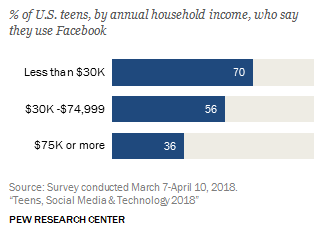A Pew survey of teens and the ways they use technology finds that kids have largely ditched Facebook for the visually stimulating alternatives of Snapchat, YouTube and Instagram. Nearly half said they’re online “almost constantly,” which will probably be used as a source of FUD, but really is just fine. Even teens, bless their honest little hearts, have doubts about whether social media is good or evil.
The survey is the first by Pew since 2015, and plenty has changed. The one that has driven the most change seems to be the ubiquity and power of smartphones, which 95 percent of respondents said they had access to. Fewer, especially among lower income families, had laptops and desktops.
This mobile-native cohort has opted for mobile-native content and apps, which means highly visual and easily browsable. That’s much more the style on the top three apps: YouTube takes first place with 85 percent reporting they use it, then Instagram at 72 percent, and Snapchat at 69.
(Update: Pew points out that because YouTube was not included in the 2015 survey, strictly speaking there is no data that specifically indicates that YouTube has surpassed Facebook in popularity — it may for all we know have always been more popular. However, as the trends are clear and further demonstrated by other usage data, I don’t think it is inaccurate to say that YouTube is among the platforms teens are choosing to use instead of Facebook. But as this is a science the distinction is worth making.)
 Facebook, at 51 percent, is a far cry from the 71 percent who used it back in 2015, when it was top of the heap by far. Interestingly, the 51 percent average is not representative of any of the income groups polled; 36 percent of higher income households used it, while 70 percent of teens from lower income households did.
Facebook, at 51 percent, is a far cry from the 71 percent who used it back in 2015, when it was top of the heap by far. Interestingly, the 51 percent average is not representative of any of the income groups polled; 36 percent of higher income households used it, while 70 percent of teens from lower income households did.
What could account for this divergence? The latest and greatest hardware isn’t required to run the top three apps, nor (necessarily) an expensive data plan. With no data to go on from the surveys and no teens nearby to ask, I’ll leave this to the professionals to look into. No doubt Facebook will be interested to learn this — though who am I kidding, it probably knows already. (There’s even a teen tutorial.)
Twice as many teens reported being “online constantly,” but really, it’s hard to say when any of us is truly “offline.” Teens aren’t literally looking at their phones all day, much as that may seem to be the case, but they — and the rest of us — are rarely more than a second or two away from checking messages, looking something up and so on. I’m surprised the “constantly” number isn’t higher, honestly.
Gaming is still dominated by males, almost all of whom play in some fashion, but 83 percent of teen girls also said they gamed, so the gap is closing.
Phone-addicted teens aren’t as happy as those who play sports and hang out IRL, new study suggests
When asked whether social media had a positive or negative effect, teens were split. They valued it for connecting with friends and family, finding news and information and meeting new people. But they decried its use in bullying and spreading rumors, its complicated effect on in-person relationships and how it distracts from and distorts real life.
Here are some quotes from real teens demonstrating real insight.
Those who feel it has an overall positive effect:
- “I feel that social media can make people my age feel less lonely or alone. It creates a space where you can interact with people.”
- “My mom had to get a ride to the library to get what I have in my hand all the time. She reminds me of that a lot.”
- “We can connect easier with people from different places and we are more likely to ask for help through social media which can save people.”
- “It has given many kids my age an outlet to express their opinions and emotions, and connect with people who feel the same way.”
And those who feel it’s negative:
- “People can say whatever they want with anonymity and I think that has a negative impact.”
- “Gives people a bigger audience to speak and teach hate and belittle each other.”
- “It makes it harder for people to socialize in real life, because they become accustomed to not interacting with people in person.”
- “Because teens are killing people all because of the things they see on social media or because of the things that happened on social media.”
That last one is scary.
You can read the rest of the report and scrutinize Pew’s methodology here.































Comment